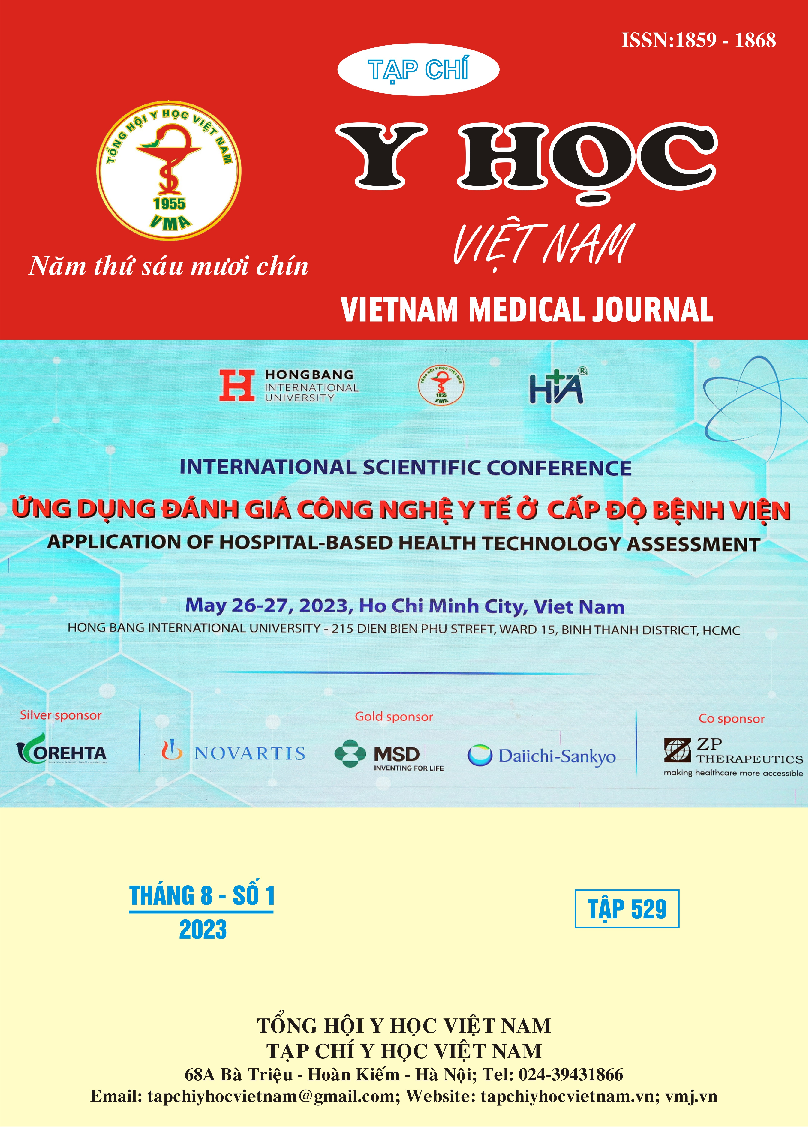KIDNEY TRANSPLANTATION FROM DECEASED DONORS: ACUTE REJECTION
Main Article Content
Abstract
Background: Acute rejection is one of the factors influencing the outcome of kidney transplantation, especially kidney transplantation from donors after brainstem death (Donation after Brainstem Death, DBD) and donors after circulatory death (Donation after Circulatory Death, DCD), as there is little time to investigate the immunological correlation between the donor and recipient. Research Objectives: Present the results of acute rejection (Acute Rejection, AR) in patients receiving kidneys from DBD, DCD, and the factors influencing acute rejection. Research Methods: A retrospective, descriptive case series study, including cases of deceased donor kidney transplantation from April 2008 to December 2021, at Cho Ray Hospital. Results and discussion: The study includes 43 cases of kidney transplants from DBD (group 1), and 8 cases from DCD (group 2). The median age of the two groups is 36, and 44.5 years respectively. Men make up the majority. The median dialysis time of group 1 is 38.7 months, and group 2 is 57 months, hemodialysis is the primary treatment method. The KDRI index of group 1 is 0.83, group 2 is 1.5. The median follow-up time of group 1 is 6.2 years, and group 2 is 4.9 years. The rate of acute rejection in the first year of group 1 is 6.9%, and group 2 is 25%. Factors affecting the rejection rate include the level of HLA compatibility, HLA DR compatibility, the group of immunosuppressive induction drugs, and the group of maintenance immunosuppressive drugs in our study have not been proven to correlate. Acute rejection in group 1 increases the risk of Cytomegalovirus infection (P=0.02), group 2 increases the incidence of tuberculosis (P=0.035), and the rate of CMV infection (P=0.035). Conclusion: Acute rejection increases the rate of CMV infection in patients receiving kidneys from brain-dead and circulatory-death donors. In addition, acute rejection increases the incidence of tuberculosis in the group of patients receiving kidneys from circulatory-death donors. However, the number of kidney recipients in our study is still small, so we have not been able to investigate factors that statistically correlate with acute rejection complications
Article Details
Keywords
Deceased Donor Kidney Transplantation (DDKTx), Acute Rejection (AR), Brain Death Donor (DBD), Circulatory Death Donor (DCD).
References
2. Nguyễn Trường Sơn, Tài NA, Liêm LT, et al. Kết quả sớm ghép thận từ người hiến thận tim ngừng đập: Nhân 2 trường hợp đầu tiên tại bệnh viện Chợ Rẫy. Tạp chí Y học TP Hồ Chí Minh. 2016;20(4):7.
3. Trần Thị Bích Hương. Suy chức năng thận ghép. In: Thức NT, ed. Hướng dẫn thực hành lâm sàng về điều phối, hiến và ghép thận. Đại Học Quốc Gia Tp. Hồ Chí Minh; 2021:35:chap 7.
4. Singh RP, Farney AC, Rogers J, et al. Kidney transplantation from donation after cardiac death donors: lack of impact of delayed graft function on post-transplant outcomes. Clinical Transplantation. 2011;25(2):255-264. doi:10.1111/j.1399-0012.2010.01241.x
5. Nagaraja P, Roberts GW, Stephens M, et al. Influence of Delayed Graft Function and Acute Rejection on Outcomes After Kidney Transplantation From Donors After Cardiac Death. Transplantation. Dec 27 2012;94(12):1218-1223. doi:10.1097/TP.0b013e3182708e30
6. Kute V, Ramesh V, Shroff S, Guleria S, Prakash J. Deceased-donor organ transplantation in India: current status, challenges, and solutions. Exp Clin Transplant. 2020;18(Suppl 2):31-42.
7. Chen G, Wang C, Ko DSC, et al. Comparison of outcomes of kidney transplantation from donation after brain death, donation after circulatory death, and donation after brain death followed by circulatory death donors. Clinical transplantation. 2017;31(11):e13110.
8. Roman J, Jalůvka F, Ostruszka P, et al. Post-Kidney Transplantation Results After Circulatory or Brain Death Without Pre-Mortem Heparin Administration. Medical Science Monitor: International Medical Journal of Experimental and Clinical Research. 2022;28:e936877-1.


